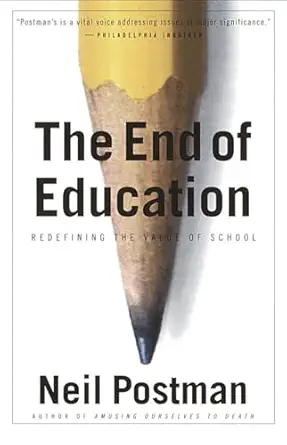The End of Education (1995)

In The End of Education, Neil Postman asks a deceptively simple question: What are schools for? He argues that when education is reduced to job training, test scores, or technology adoption, it loses its moral center. Schools, he says, need sustaining cultural narratives—shared “gods” that give purpose and coherence to learning.
Postman critiques dominant “false gods” such as economic utility, consumerism, and technophilia, which turn classrooms into performance dashboards. In their place, he proposes richer stories—about democracy, Earth stewardship, language and meaning, community, and the pursuit of truth—that invite students into responsibility rather than mere achievement.
Education, Postman suggests, must offer reasons for learning that transcend “getting ahead”—reasons that help young people imagine a life worth living together.
Key Ideas from the Book
- Education Needs a Narrative: Facts and skills require a moral frame—“What is this for?”—to become wisdom.
- Beware of False Gods: Economic competition, technocracy, and measurement can’t supply meaning.
- Proposed “Gods”: Stories of democracy, Earth as home, the Word (language & meaning), the American experiment, and the fallen nature of human knowledge (intellectual humility).
- School as a Public Sphere: A place to practice citizenship, ethical reasoning, and stewardship—not only career prep.
- Teachers as Story-Bearers: Educators curate traditions and questions that help students situate themselves in history and community.
Why It Still Matters
In an era saturated with metrics and ed-tech platforms, Postman’s call to re-center schooling on meaning and responsibility feels newly urgent. The End of Education invites educators and families to ask not only how students learn, but why—and to build schools around shared purposes worthy of their attention and hope.